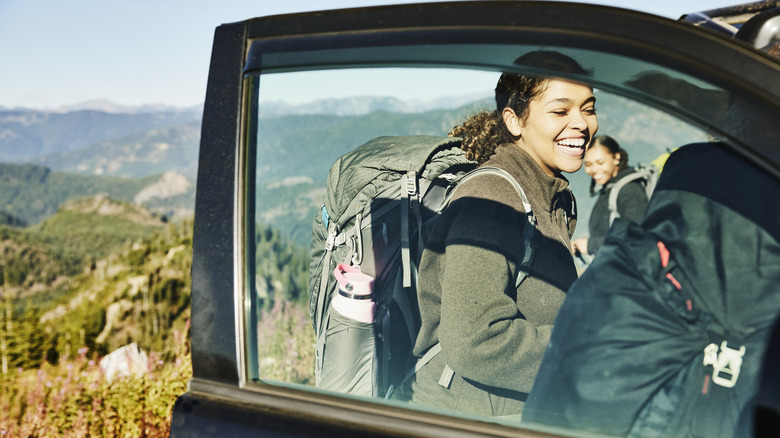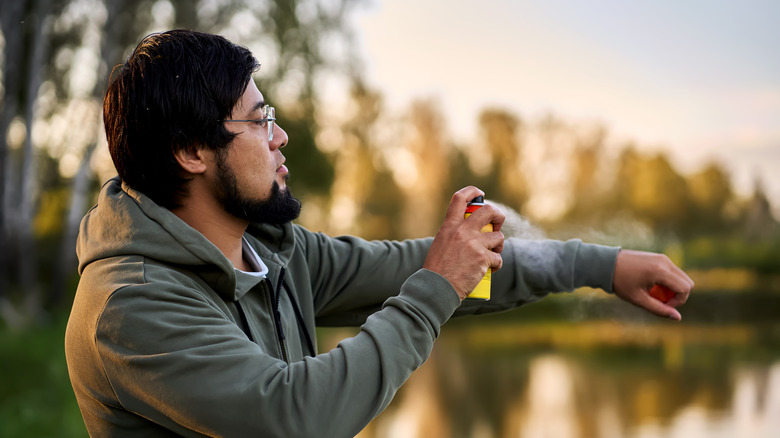The First Thing You Should Do After A Hike To Avoid Ticks
An exhilarating hike through the woods on a gorgeous summer afternoon can be the highlight of your week. Finding a little tick clicking to your skin trying to suck your blood? Not so much. Not only is it unsettling to find a little parasitic stowaway clamped onto you, ticks carry a number of diseases, like Lyme Disease, which they can spread to their human hosts.
Obviously, you don't want to let that keep you from enjoying the beautiful weather outdoors, so to find out the best strategies for staying healthy, Islands spoke to Distinguished Senior Scientist at the Cary Institute of Ecosystem Studies: Richard Ostfeld. Ostfeld studies the ecology of infectious diseases, particularly those carried by ticks. He explained that you should search your body for ticks right away after your hike, even before you leave the trail.
"Before the hiker gets home or even into the car, they should do a careful tick check. This involves inspecting one's clothing systematically, looking for little, dark specks that might be moving slowly," Ostfeld explained. "Ticks usually 'quest' (seek an animal host) low to the ground, so our feet, ankles, and lower legs are the first places they latch on. But ticks often crawl upwards once they're on you, so they can easily make it all the way up to the head, given a few hours."
What to do once you get home from your hike
Whether or not you've diligently checked yourself for ticks at the trailhead, you should take precautions against ticks as soon as you get home. Just like when you're trying to keep bedbugs from coming home with you from your vacation, the answer to keeping ticks out of your space might be in the laundry room. Dr. Richard Ostfeld told us that the best thing you can do as soon as you get home is to strip and toss your clothes into the dryer right away. While you might be tempted to run them through the wash first, considering you just wore them on a hike, Ostfeld told Islands that you're better off cranking your dryer up to high heat and tossing your clothes straight in. "Ticks are remarkably good at surviving heat when it's also moist and have been known to make it through a wash and dry cycle," he explained. "But a hot dryer with no moisture will kill them fairly quickly."
Before you put on your cozy clothes and relax after your hike, make sure to check yourself for ticks, even if you already did so before coming home. Ticks are looking for bare skin to bite, so they may have worked their way under your clothes. They can be small and tricky to see, so it's vital to do as thorough a check as possible, and, ideally, you should also have a hiking buddy check your back. If you don't have a friend available, Ostfeld shared a good safety tip for solo hikers: use a hand mirror to check your back for ticks.
What to do if you get bitten by a tick
Ticks are very widespread and, although they are most prevalent between April and October, can theoretically be an issue any time the weather is warm enough for them to crawl around looking for something to bite (around 40°F), so if you love spending time outdoors, you're going to need some clever tips to avoid being bitten by ticks on your hike. According to Richard Ostfeld, the best ways to avoid getting bitten are to use a repellent with DEET or picaridin in it or wear clothing that has been treated with permethrin, an insecticide that is effective against ticks. What should you do if you have already been bitten, though?
"If you find a tick on your clothing or on your skin upon returning home, remove it with a fine-tipped tweezers, and either discard the tick (flushing down the toilet works) or tape it (transparent tape) to a white card or piece of paper ... the tick can usually be identified to species through the tape, which can be useful if symptoms of tick-borne illness manifest later on," Ostfeld told Islands. While this can be more difficult to do when you're on the trail, he suggested that hikers carry a pocket knife that has tweezers in case they need to remove a tick that has latched on during the hike.


